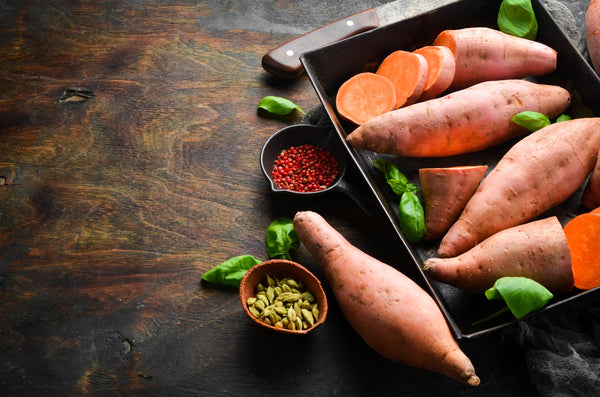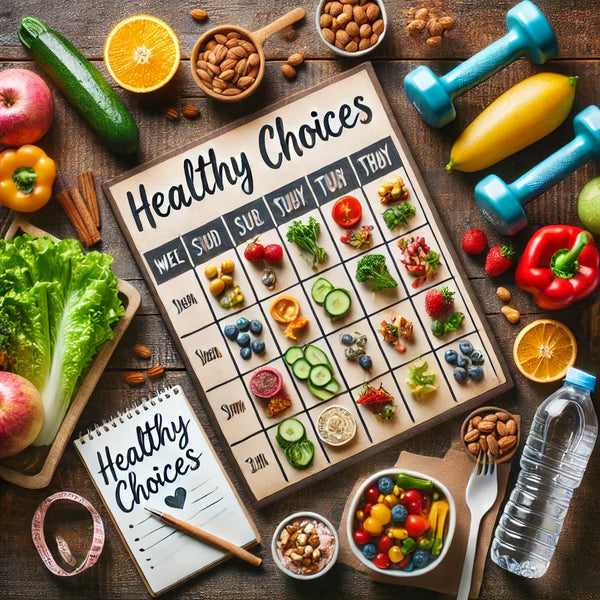Sample Weekly Meal Plan for Athletes to Maximise Endurance
by JUSTINE YOLANDA

Ask any endurance athlete, and they’ll tell you the same thing: it’s not just about the miles you put in, but the food you put on your plate. From runners hitting the wall mid-race to cyclists feeling drained halfway through a ride, poor nutrition sabotages performance faster than any missed workout. The real problem? Most athletes don’t have a structured nutrition plan that supports their long-distance training goals.
Endurance sports demand more than just willpower and training volume; they require a precise balance of carbohydrates, proteins, fats, and hydration strategies to maintain energy, speed up recovery, and prevent burnout. Without proper fueling, you risk bonking, delayed muscle repair, poor sleep, and reduced immune function. And if you're trying to juggle training with work or family, haphazard eating simply won’t cut it.
That’s where a weekly meal plan for endurance athletes comes in. Instead of winging your meals or relying on last-minute choices, a structured approach ensures you're always one step ahead fueling your body for performance, not just survival.
In this guide, we’ll break down a sample weekly athlete's meal plan, complete with daily breakdowns, macro targets, and real-food examples. You’ll also get a grocery list tailored for high-output athletes and expert-backed fueling tips to help you go longer, stronger, and smarter.
Why Endurance Athletes Need a Specialised Meal Plan
Endurance athletes face unique physiological demands. Logging long hours of running, cycling, or swimming places immense stress on the body and without a specialised meal plan, many end up under-fueled, under-recovered, and prone to injury or burnout.
One of the biggest challenges is energy expenditure. Long-distance training can burn hundreds or even thousands of calories daily. If those calories aren't replaced strategically, athletes may experience chronic energy deficits, resulting in persistent fatigue, impaired performance, and an increased risk of illness.
Glycogen, the body’s primary fuel during prolonged aerobic exercise, is also limited. When stores are depleted and not replenished, athletes "hit the wall," a condition marked by sudden exhaustion and a sharp drop in performance. This makes proper carbohydrate timing essential before, during, and after training sessions.
Recovery is another area where nutrition plays a major role. Without sufficient protein intake spread throughout the day, the body struggles to repair muscle tissue compromising long-term adaptation and progress. Fat, often overlooked, supports hormone regulation and provides sustained energy for lower-intensity sessions.
A well-structured endurance nutrition plan prioritises:
-
Carbohydrates as the main energy source
-
Protein to support muscle recovery and immune health
-
Healthy fats for sustained energy and metabolic support
Ultimately, training without proper fueling is like trying to drive a car on an empty tank. A specialised meal plan ensures endurance athletes can train harder, recover faster, and perform at their peak consistently and sustainably.
Macronutrient Guidelines & Daily Calorie Targets
To fuel endurance training effectively, athletes must follow precise macronutrient ratios and daily calorie goals. These targets help optimise energy, support muscle repair, and sustain long-duration efforts across training cycles. Below is a breakdown of each key macronutrient and hydration essentials:
Carbohydrates: 55–65% of Total Intake
Carbohydrates are the primary fuel source for endurance athletes. They replenish glycogen stores, delay fatigue, and enhance performance. Aim for complex, slow-digesting carbs throughout the day, with faster-absorbing carbs before and after workouts.
Top sources: Oats, sweet potatoes, whole grain pasta, brown rice, bananas, and dates.
Carb needs typically range from 5–10g per kilogram of body weight per day, depending on training volume and intensity.
Protein: 1.2–2.0g per kg of Body Weight
Protein is essential for muscle repair, recovery, and immune function. Distribute intake evenly across meals to promote muscle protein synthesis.
Top sources: Lean meats (chicken, turkey), tofu, eggs, Greek yogurt, legumes, whey protein.
Recovery meals should include both protein and carbs within 30–60 minutes post-exercise for optimal results.
Fats: 20–30% of Total Intake
Fats support hormone production, joint health, and serve as a long-lasting fuel source during lower-intensity, steady-state training.
Top sources: Avocados, olive oil, nuts, seeds, fatty fish like salmon, and nut butters.
Avoid cutting fats even during weight-sensitive training phases as they’re critical for overall health and endurance performance.
Hydration & Electrolytes
Proper hydration supports blood flow, thermoregulation, and nutrient transport. During long or hot sessions, electrolyte loss through sweat must be replenished.
Key elements: Sodium, potassium, magnesium, and chloride through sports drinks, electrolyte tablets, or salty snacks.
Sample Weekly Meal Plan for Endurance Athletes
This sample meal plan is tailored for endurance athletes training 5–6 days a week. It’s designed to provide sustained energy, enhance recovery, and support peak performance. Each day averages between 2,800–3,500 calories, depending on portion size and training load. Pre-workout meals emphasise high-carbohydrate options, while post-workout meals focus on recovery.
Monday
-
Breakfast: Oatmeal with banana, chia seeds, almond butter, and a scoop of whey protein
-
Lunch: Grilled chicken breast with brown rice, roasted vegetables, and olive oil drizzle
-
Dinner: Baked salmon with sweet potato mash and sautéed spinach
-
Snacks/Post-Workout: Medjool dates and a protein shake post-run; handful of mixed nuts
Tuesday
-
Breakfast: Scrambled eggs on whole-grain toast with avocado slices and berries
-
Lunch: Whole wheat tuna wrap with mixed greens, hummus, and carrots
-
Dinner: Stir-fried tofu with rice noodles, broccoli, and sesame oil
-
Snacks/Post-Workout: Greek yogurt with granola and blueberries; rice cakes with peanut butter
Wednesday
-
Breakfast: Smoothie with oats, banana, berries, protein powder, and almond milk
-
Lunch: Quinoa salad with grilled chicken, cherry tomatoes, feta, and olive oil
-
Dinner: Turkey chili with kidney beans, sweet corn, and brown rice
-
Snacks/Post-Workout: Hard-boiled eggs, banana with honey; chocolate milk post-training
Thursday
-
Breakfast: Whole-grain pancakes with maple syrup, mixed berries, and Greek yogurt
-
Lunch: Baked falafel in a whole wheat pita with tahini and tabbouleh
-
Dinner: Grilled shrimp with couscous, steamed broccoli, and lemon vinaigrette
-
Snacks/Post-Workout: Trail mix, protein bar, and apple slices
Friday
-
Breakfast: Peanut butter banana toast with flaxseeds and orange juice
-
Lunch: Beef stir-fry with jasmine rice and mixed peppers
-
Dinner: Stuffed bell peppers with quinoa, black beans, and avocado
-
Snacks/Post-Workout: Protein smoothie post-run, Greek yogurt with honey
Saturday (Long Run Day)
-
Breakfast: Oats with raisins, banana, maple syrup, and whey protein
-
Lunch: Whole-grain pasta with turkey meatballs and marinara sauce
-
Dinner: Grilled chicken thighs with roasted root vegetables and couscous
-
Snacks/Post-Workout: Rice pudding with honey; peanut butter toast; electrolyte drink post-run
Sunday (Recovery Day)
-
Breakfast: Chia seed pudding with almond milk, mango, and granola
-
Lunch: Tuna salad with boiled eggs, sweet potato, mixed greens, and olive oil
-
Dinner: Vegetable curry with basmati rice and a side of lentil dal
-
Snacks/Post-Workout: Smoothie with berries, oats, spinach, and protein; handful of almonds
Final Note:
Each day in this weekly meal plan balances energy intake with training demands. The meals are easy to prep ahead and use familiar, whole-food ingredients tailored for endurance nutrition. Sticking to this plan helps endurance athletes prevent energy dips, recover more effectively, and train consistently at a high level.
Pre- and Post-Workout Nutrition Tips
The timing and composition of your meals around workouts can make or break your performance and recovery. Choosing the right pre-workout meals and post-run recovery food ensures your body is properly fueled and primed for gains not just grinding through.
Pre-Workout Fuel: 1–2 Hours Before Training
Before training, the goal is to top off glycogen stores without upsetting your stomach. Focus on easy-to-digest carbohydrates paired with a small amount of protein or healthy fat. Avoid high-fiber or greasy foods that may cause GI distress during long sessions.
Quick Pre-Workout Meal Ideas:
-
Banana with a tablespoon of peanut butter
-
Rice cakes with honey or jam
-
Oats with almond milk and sliced fruit
-
White toast with boiled eggs
These options provide fast-acting carbs and just enough protein or fat to sustain energy without slowing digestion ideal training fuel for endurance sessions.
Post-Workout Recovery: Within 30 Minutes
After training, especially long or high-intensity workouts, your muscles are primed for repair and glycogen replenishment. This is the window where smart nutrition accelerates recovery, reduces soreness, and improves adaptation.
Top Post-Workout Food Examples:
-
Protein smoothie with oats, berries, and whey
-
Grilled chicken with white rice and steamed veggies
-
Chocolate milk and a banana
-
Greek yogurt with honey and granola
Aim for a 3:1 or 4:1 ratio of carbs to protein immediately post-exercise. If you're short on time, real food options like smoothies or toast with eggs work just as well as commercial sports supplements and often come with added vitamins, minerals, and fiber.
Whether you're running intervals or riding long, dialing in your nutrition before and after each session is non-negotiable for peak performance and faster recovery.
Grocery List for the Week
A well-stocked kitchen is the backbone of consistent, performance-driven nutrition. Here's a categorised grocery list tailored for endurance athletes following this meal plan. Having these ingredients on hand means less guesswork, more fueling power, and faster meal prep.
Carbohydrates
-
Rolled oats
-
Brown rice
-
Whole grain pasta
-
Sweet potatoes
-
Quinoa
-
Rice cakes
-
Whole grain bread
-
Bananas, berries, apples, oranges
Proteins
-
Chicken breast
-
Lean turkey or beef
-
Tofu and tempeh
-
Eggs
-
Greek yogurt
-
Cottage cheese
-
Canned tuna or salmon
-
Whey or plant-based protein powder
Healthy Fats
-
Avocados
-
Olive oil
-
Almonds, walnuts, mixed nuts
-
Nut butters (peanut, almond)
-
Chia seeds, flaxseeds
Extras & Essentials
-
Spices: turmeric, cinnamon, garlic, black pepper
-
Low-sugar electrolyte tablets or powders
-
Sports supplements (optional): BCAAs, creatine, magnesium
-
Herbal teas or decaf coffee for evening recovery
Common Mistakes to Avoid in Endurance Nutrition
Even well-trained athletes can sabotage their progress with poor nutrition habits. Understanding the most frequent nutrition mistakes can help you fuel smarter and perform consistently throughout training cycles.
1. Not Eating Enough Carbohydrates
Carbs are the primary energy source for endurance athletes. Cutting carbs in favor of high-protein or low-carb trends can lead to glycogen depletion, early fatigue, and slower recovery. Fueling errors like this often result in hitting the wall during long sessions.
2. Skipping Meals on Rest Days
Many assume they need fewer calories on non-training days, but this is when recovery and muscle repair happen. Skipping meals slows adaptation, weakens immunity, and leaves you under-recovered for your next session.
3. Overdoing Protein or Fat
While protein is crucial for recovery, too much can crowd out carbs. Likewise, excess fat can delay digestion, especially if eaten close to training. The endurance athlete diet should always prioritise carb timing around workouts.
4. Underhydrating
Dehydration, even at just 2%, reduces endurance, focus, and thermoregulation. Many athletes neglect daily water intake or fail to replace electrolytes lost in sweat especially in heat or during multi-hour efforts.
Avoiding these common pitfalls ensures you're not just training hard, but recovering, adapting, and performing at your full potential. Good nutrition isn’t just a supplement to your training, it's a core part of it.
Expert Tips to Maximise Nutrition Benefits
Getting the most out of your training isn’t just about what you eat, it's also about when and how. These expert-backed strategies help endurance athletes fine-tune their nutrition plan for peak performance and recovery.
1. Time Meals Around Training
Nutrition timing is critical. Eat a high-carb, moderate-protein meal 1.5–2 hours before a workout for sustained energy. Within 30–60 minutes post-exercise, refuel with a mix of fast-digesting carbs and protein like a smoothie with oats and whey to accelerate glycogen replenishment and muscle recovery.
2. Batch Cook and Prep Ahead
Meal prep for athletes is a game-changer. Cook in bulk on rest days, think grilled chicken, roasted veggies, or quinoa and portion meals for the week. Having grab-and-go options eliminates decision fatigue and reduces reliance on less nutritious convenience foods.
3. Adjust Intake by Training Phase
During competition weeks or long-distance build-ups, slightly increase carb and calorie intake. In contrast, during deload or rest weeks, reduce portion sizes but maintain protein and micronutrient density to support recovery.
4. Track Energy & Performance Trends
Use simple journaling or apps like MyFitnessPal, Cronometer, or TrainingPeaks to track energy levels, sleep, and digestion. Over time, this helps you identify patterns like when underfueling leads to fatigue or mood swings.
Dialing in your training nutrition strategy with these tips ensures you’re not just eating well, but eating smart with purpose and performance in mind.
Conclusion: Fuel with Purpose, Perform with Power
For endurance athletes, nutrition isn’t just a side note, it's the fuel that powers every mile, every session, and every breakthrough. Treating food as a performance tool, not an afterthought, separates the consistently strong from the constantly struggling.
By following a structured weekly nutrition plan, you’re setting yourself up for improved energy, faster recovery, and sustained performance throughout your training cycle. No more guesswork. No more bonking.
Ready to level up your fueling strategy? Try the sample weekly plan above and start tracking how your body responds. For a truly personalised approach, consider working with a registered sports dietitian to tailor your nutrition to your specific goals, training volume, and lifestyle.
Train hard. Fuel smart. Recover fully. Repeat.
FAQs: Nutrition for Endurance Athletes
Q1: What’s the best breakfast before a long run?
A balanced mix of carbs and a bit of protein is ideal. Options like oatmeal with banana and nut butter or toast with honey and eggs provide sustained energy without GI distress. Aim to eat 1.5–2 hours before your run.
Q2: Can I follow a plant-based endurance meal plan?
Absolutely. A plant-based nutrition plan can support endurance training if it includes varied sources of protein (like lentils, tofu, quinoa), iron-rich foods, B12 supplementation, and adequate calorie intake to meet energy demands.
Q3: How many carbs do endurance athletes need daily?
Endurance athletes typically need 5–10 grams of carbohydrates per kilogram of body weight per day, depending on training volume and intensity. Carbs are essential for maintaining glycogen stores and supporting prolonged effort.
Q4: Is intermittent fasting okay for endurance athletes?
Generally, no. Fasting may impair training quality, recovery, and energy availability. Endurance athletes require regular fueling to support performance, hormone function, and muscle repair especially around key sessions.




